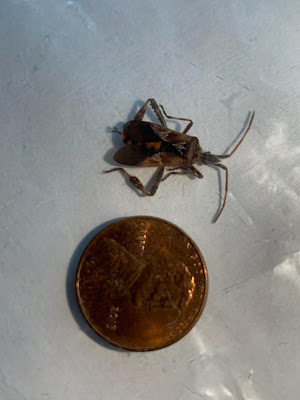This week's case is courtesy of Dr. Charlie Huskins, one of our pediatric ID physicians. The parents of his patient found the following bug in their home and were concerned that it might be a disease vector. They are concerned that it might have bitten their child, as they have identified a potential 'bite' mark.
Of note, the family lives in the midwestern United States and has no history of recent travel.
What is the general identification of this bug? Is there any concern for disease transmission?

Mostly Triatoma megista, the kissing winged bug of Latin America. I plays a vector role in American Trypanosome transmission causing Chagas disease.
ReplyDeleteThick Blood film is needed to detect the monomorphic C or U shaped trypomastigotes in-between RBCs as they are scanty.
Serological methods may be tried.
Triatoma itself may be used to detect the infection via dissection and examination.
Conifer seed bug who's defense is to emit a bad smell. Typically, would not bite or injure a human likely not be a disease vector.
ReplyDeleteWestern seed confer bug, Leptoglossus occidentalis
ReplyDeleteAgree with bug, but they'll usually give you a bite if you handle them improperly, or maybe get caught in your shoe!
ReplyDeleteOK, we should be aware of triatomine bugs for their role in the transmission of Chaya’s disease caused by Trypanosoma cruzi.
ReplyDeleteHowever in this case, the lesion is not typical like the bite mark of a kissing bug. Furthermore, the markings are lacking and the rear legs sport lateral protrusions not typical of a kissing bug. This one stinks rather than sting, “The Imposter”.
Florida Fan
Looks like a leaf-footed bug to me, NOT A VECTOR!
ReplyDeleteAgree with most colleagues. It is the western conifer seed bug (Leptoglossus occidentalis). No known human vectorial ability. Morphological differentiation with kissing bugs is well summarized at: https://insectlab.russell.wisc.edu/2015/12/08/was-that-a-kissing-bug/
ReplyDeleteInteresting case Dr. Pritt, as always.
Luis H.
Here’s a very interesting article on kissing bugs vs. look alike:
ReplyDeletehttps://kissingbug.tamu.edu/found-a-bug/
Florida Fan
Agree with the imposter Leptoglossus occidentalis.
ReplyDelete